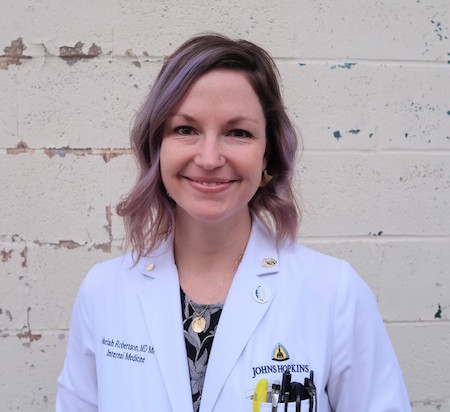Takeaway
LGBTQ seniors are at a significantly higher risk for health disparities and frequently withhold their gender identity or sexual orientation from their physician due to fear of being turned away or discriminated against. It is up to each of us to educate ourselves so we can be empowered to routinely ask about the sexual health of our aging patients.

Lifelong learning in clinical excellence | August 9, 2018 | 4 min read
By Mariah Robertson, MD, Johns Hopkins Medicine
We’re re-featuring this piece today in recognition of Healthy Aging Month 2024
Taking a break studying for boards, I scrolled through my Instagram feed. I came across a beautiful photo of two elderly gentlemen in an intimate embrace. The caption was a simple quotation that expressed their fear of aging. Specifically, they highlighted the very real fear of having to live in a long-term care facility one day. This couple that came out many years before worried they would have to hide their sexual orientation to avoid discrimination and abuse.
This concept isn’t completely foreign to me. In medical school, our geriatric interest group watched “Gen Silent,” a 2010 documentary that highlighted the lives of six LGBT seniors around Boston and their struggles with navigating the long-term healthcare system. I remember watching the film and feeling like this was something we just weren’t talking about or addressing in the field of medicine.
A study out of the University of Washington confirms just that. Dr. Karen Fredriksen-Goldsen has been studying the health, aging and well-being of aging LGBTQ older adults through the “Aging with Pride: National Health, Aging, and Sexuality/Gender Study (NHAS).” Here, she tells the stories of more than 2,500 lesbian, gay, bisexual, and transgender older adults from across the United States.
What Dr. Fredriksen-Goldsen and her team discovered is that the health disparities sexual minority older adults face are a reflection of the serious adversities they have encountered in their lives. Many LGBTQ adults face fear of discrimination, and many also do not have children or partners to help with caregiving as they become more dependent in their needs. These individuals are at greater risk for social isolation and financial insecurity, both of which have downstream effects on mental and physical health. Additionally, while certainly on the rise, there is still a dearth of social and community resources for LGBTQ elders.
Perhaps the most concerning piece of information for me as a healthcare provider is the fact that 21% of those surveyed had not told their doctors about their sexual orientation or gender identity. The primary reason was fear of being turned away from care or receiving inferior health care. This fear had been realized in 13% of the participants who had one or both of these experiences when receiving medical care. As you can imagine, this leads to incomplete discussions around sexual health, cancer risk, sexually transmitted diseases, and options for hormonal therapies. This also translates to greater rates of disability, depression, and loneliness. As compared to heterosexual elders, the participants in the study showed significantly higher likelihood for chronic health conditions such as stroke and heart disease.
Realizing that as a white, cisgender, heterosexual female I can’t fully understand the challenges my LGBTQ patients face, I take this as a call to arms for myself and other medical providers caring for this population. As a young physician I pride myself on feeling comfortable with discussions around sexual health and risk reduction in my younger patients but I am woefully inadequate at these discussions with my older patients. I want to be an ally and a provider that all of my patients can trust. I am inspired by the work that Dr. Fredriksen-Goldsen and others are doing in this realm. We have the privilege as physicians to share in the most intimate aspects of our patients’ lives. We are failing them if we don’t educate ourselves and we are failing them if we don’t ask.
How to improve the current state of our practice:
1. Ensure access to nonjudgmental care with thought placed in how we frame our intake forms and the pronouns we use in our materials and in addressing our patients.
2. Take time to educate ourselves around what patients can expect with transitioning and know the resources we have in our own institution.
3. Don’t put the burden on our patients to discuss their sexuality. Ask them. This will help us take better care of them and will help us to better understand the nuances that may exist in screening for things like cancer and cardiovascular disease. See below for some resources on this.
4. The literature supports the fact that people with an active sex life as they age tend to live longer, but we often assume heterosexuality in our patients. We need to strive to better understand the lives of all of our patients.
Important resources to help us grow in our practice:
Through funding by the US Department of Health and Human Services and collaboration between SAGE and ten leading organizations nationwide, the National Resource Center on LGBT Aging was created and is a wonderful resource to start educating yourself and your patients about the resources available to our sexual minority older adults.
This piece expresses the views solely of the author. It does not necessarily represent the views of any organization, including Johns Hopkins Medicine.

